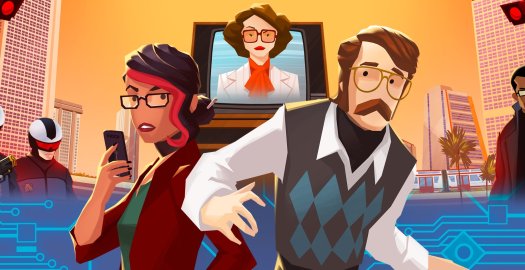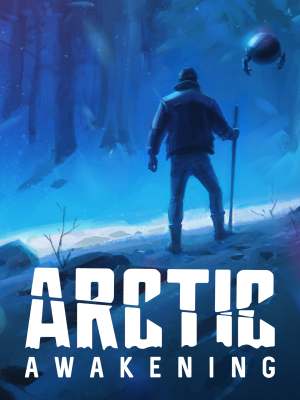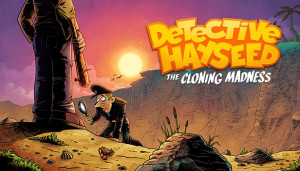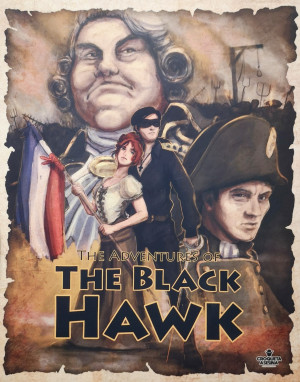Review for American Arcadia

Storytelling is similar to activities like painting or drawing. While an empty canvas or sheet of paper leaves many possibilities to explore, artists use common styles or trends to get their points across. To that end, storytellers use a lot of familiar themes and tropes that the most seasoned of critics can look at and predict where the narrative will go. Some stories aim to “subvert expectations,” yet American Arcadia features one of the few game-based narratives in recent years to do this exceptionally well. On top of that, it uses multiple points of view and gameplay elements that add variety, and the presentation is excellent and unique.
Developed by Out of the Blue Games and published by Raw Fury, American Arcadia centers around Trevor Hills, a citizen living in the supposed utopia called Arcadia. That is until the anonymous Kovacs, who is part of an activist group called Breakout, reveals to him that Arcadia is, in fact, a TV show where those with increased viewer counts thrive, and anyone who is not getting watchtime is “taken off the air.” With Breakout’s help, Trevor’s goal is to escape Arcadia and reveal the truth about what Arcadia is to the world.
That is, at least, what the player is set up to believe from the onset. It plays out like a typical “business conglomerates are bad” type of story. Later, players can see that the company behind American Arcadia, Walton Media, is an alternate version of the Walt Disney Company, its original roots corrupted by the current people in charge. It is a contemporary yet relatable piece, considering what has happened with the Disney company in recent years. Still, the narrative presents surprises that advance intricate world-building and reveal some plot twists that many modern games or movies attempt but sometimes fumble. What’s more, the building blocks of said events are subtly hinted at throughout the game, but only at the end is everything revealed, leaving the players dumbstruck. Yet it all makes sense when putting the pieces together.
The presentation helps the story in this regard. The environments are gorgeous, with colors that pop and help each environment feel distinct. Arcadia is a vibrant city in the daytime, host to some of the cleanest suburbs, hotels, and mall areas ever seen. In contrast, Walton Media and the outside world use neutral or drab colors, enforcing Arcadia’s status as a utopia. Dusky areas are also a treat, where shadows and dark patches look almost like ink, yet light sources vary in brightness and tone.
Character models are a peculiar feature. Everyone looks roughly like 3D-rendered puppets, their eyes black and their figures almost toy-like. Some characters with facial hair have no mouths (Trevor Hills for example). However, there is this feeling that the art style used is somehow familiar, similar to a TV show watched during one’s childhood; yet the memory is just out of reach, no matter how much you try to recollect it. There may be one or two instances of a character’s design being inconsistent, but only one instance where it is noticeable.
What also makes the characters stand out are their personalities and voicework. Take the two main characters: Trevor is a pretty average guy on the surface. It’s why Walton Media wants to axe him from the show. Yet, his complexities and introverted nature are revealed gradually throughout the game. About a third of the way into the story, Angela, one of Breakout’s agents, is introduced. She has intricate hacker knowledge and muses about how good Walton Media was back in the day, but she makes mistakes and causes serious slip-ups she later has to address. Also, she’s a bit of a nerd, as revealed by the tabletop RPGs and posters inside her apartment. The voice actors, many of whom are very well known in video games, TV, movies, and anime, are at their best in this game. For example, Trevor Hills is voiced by the one and only Yuri Lowenthal (Sasuke in Naruto, Peter Parker in Insomniac’s Spider-man), with Krizia Bajos as Angela, and Cissy Jones as the antagonist, Vivian Walton. They and the other actors have done fantastic jobs to bring their respective characters to life and make them stand out. The voices also help overcome occasional issues with the subtitles, which can be inaccurate.
The musical score is good too, adding to the alternate Walt Disney vibe. There is a happy-go-lucky atmosphere in the beginning when Trevor is initially unsuspecting of his surroundings. Tension heightens when Trevor starts finding out the truth and is chased by henchmen. During stealth sections, the instruments become soft and somber. Still, when listened to closely, the violins, piano, trumpets, and others make it apparent that the soundtrack is Disney-inspired, similar to what you may hear from an animated or Pixar film. Players might not notice this at first, but the influences are apparent when listening to the soundtrack on its own.
Besides the story and presentation, the gameplay brings a variety of shakeups. American Arcadia puts the players in the shoes of both Trevor and Angela but from different perspectives. Trevor’s gameplay is a 2D side-scroller, controlling the character using the A and D keys for movement, W and S for ladders, SPACE for jumping, and CTRL for grabbing and moving particular objects. Trevor is primarily involved in platforming or stealth sections with the odd puzzle here and there. Angela can sometimes tap into Arcadia’s security cameras and manipulate technology to get Trevor over certain obstacles or help when Walton Media’s henchmen are chasing him.
Angela’s gameplay is from the first-person perspective and is primarily puzzle-centric. She goes around the office, committing sabotage or subterfuge that assists Trevor directly or helps herself out of situations that could blow her cover. Most of the conundrums are a fair challenge, but a couple of the puzzles near the end are somewhat tricky, one of which has a poorly explained solution. Angela’s perspective is also where players explore the world outside Arcadia, seeing Walton Media’s beginnings, when it started to go wrong, and how the company and the show operate.
Both Trevor’s and Angela’s gameplay, in tandem, create a loop in which players will nary find a moment of boredom or tedium, except for a couple of puzzles. Some of these instances are a matter of trial and error, but ascertaining solutions is quick, and players are brought back to a checkpoint almost instantly upon death. It is a refreshing choice within the video game landscape, where other games of various genres frequently use either repetition with little variety or differing objectives with only one way to solve them. American Arcadia keeps gameplay instances fresh to the point where the core gameplay loops don’t even feel like loops.
Out of the Blue Games have outdone themselves with American Arcadia. It is one of the few games I could sink hours into because of the outstanding plot and fleshed-out world; even if I thought I knew where it was going, I always wanted to know how it would end. The twists made me realize just how unorthodox the story is, and that made me think much more deeply about what the narrative was conveying.











__medium.jpeg)
















